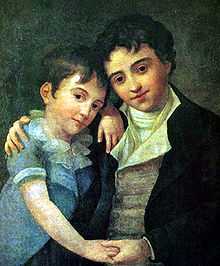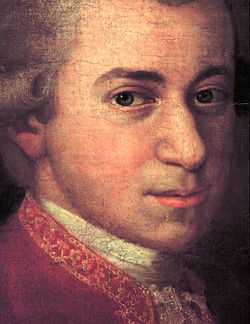Karl Thomas Mozart
 Karl Thomas Mozart, daguerreotype, 1856  The two surviving sons of Wolfgang Amadeus and Constanze Mozart: Franz Xaver Wolfgang Mozart (left) and Karl Thomas (right). Painting by Hans Hansen, Vienna, 1800. |
Karl (or Carl) Thomas Mozart (21 September 1784 – 31 October 1858) was the second son, and the elder of the two surviving sons, of Wolfgang and Constanze Mozart. The other was Franz Xaver Wolfgang Mozart.[1]
Biography
Karl was born in Vienna. His schooling, in Prague, was under Franz Xaver Niemetschek and František Xaver Dušek, and he became a gifted pianist. Before he finished his schooling, however, he left for Livorno in 1797 to begin his apprenticeship with a trading firm.[2]
He planned to open a piano store in the following years, but the project failed for lack of funds. He moved to Milan in 1805 and studied music with Bonifazio Asioli, though he gave up his studies in 1810 to become an official in the service of the Austrian financial administration and the governmental accounting department in Milan.[3] He also served as official translator for Italian for the Austrian Court Chamber.[4] He owned a house in the village of Caversaccio in Valmorea, Province of Como; he appreciated the amenities of the place and the wholesomeness of the water. He bequeathed the house to the town, which is stated on a plaque dedicated to him. The Town Hall keeps a copy of the will.[5]
He also frequently attended events related to his father until his death in Milan in 1858. Like his brother, he neither married nor had children, and the direct Mozart line thus died with him.[6]
References
- ↑ John Rosselli (28 April 1998). The Life of Mozart. Cambridge University Press. pp. 169–. ISBN 978-0-521-58744-0.
- ↑ Cliff Eisen; Simon P. Keefe (4 January 2006). The Cambridge Mozart Encyclopedia. Cambridge University Press. pp. 297–. ISBN 978-1-139-44878-9.
- ↑ Internationale Stiftung Mozarteum Salzburg (1998). Mitteilungen der Internationalen Stiftung Mozarteum (in German). p. 29.
- ↑ Michael Lorenz: "An Unknown Mozart Work", Vienna 2012
- ↑ Erich Schenk (1960). Mozart and His Times. Secker & Warburg. p. 450.
Before he died on October 31, 1858, as a pensioned-off public accountant in Milan, Karl Thomas was the recipient of the benefits of legislation ... From royalties on three Paris performances of Figaro he received some ten thousand francs, enough to buy a country estate at Caversaccio in Como Province.
- ↑ Hermann Abert (2007). W. A. Mozart. Yale University Press. pp. 1340–. ISBN 978-0-300-07223-5.
External links
- Michael Lorenz: "Carl Thomas Mozart's Original Baptismal Entry", Vienna 2013
| ||||||||||||||||||||
|
